Questões de Língua Inglesa do ano 2010
Lista completa de Questões de Língua Inglesa do ano 2010 para resolução totalmente grátis. Selecione os assuntos no filtro de questões e comece a resolver exercícios.
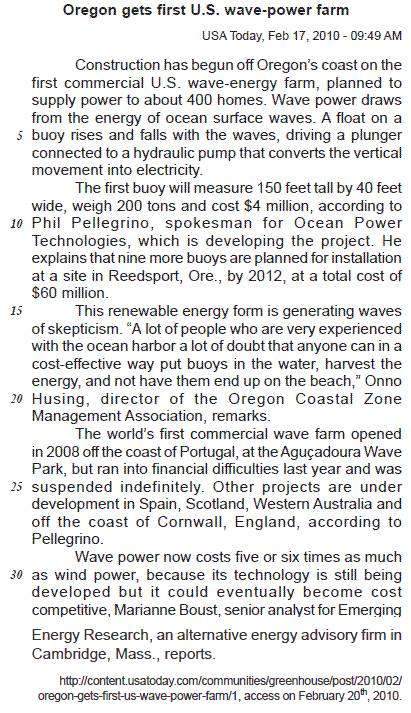
Identify the only statement about wave energy that is FALSE, according to information in Text 2.
- A.
The pioneer wave project to generate energy for commercial consumption was developed in Portugal.
- B.
Many different countries in Europe and other continents have started their own wave-energy projects.
- C.
Financial difficulties have forced the first commercial wave farm in the world to close down.
- D.
Wave energy will never be cost-effective since the ocean surface is hard to control.
- E.
Wave energy is generated by means of pumps that transform the rising and falling movement of the waves into electricity.
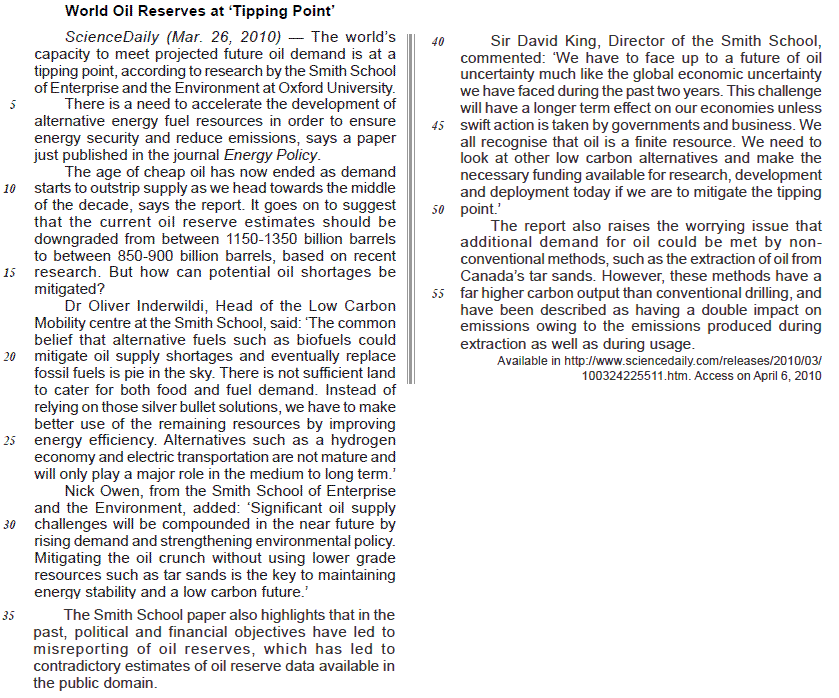
The author reports that world oil reserves are at a tipping point because oil
- A.
is already being replaced by alternative fuels in most uses of the fuel.
- B.
is now in shortage and will not supply global needs in the near future.
- C.
has already been substituted by alternative energy fuel resources worldwide.
- D.
has been misreported as non-abundant to satisfy political interests of non-producing nations.
- E.
has reached a peak in off-shore wells and is now abundantly extracted from tar sand reserves.
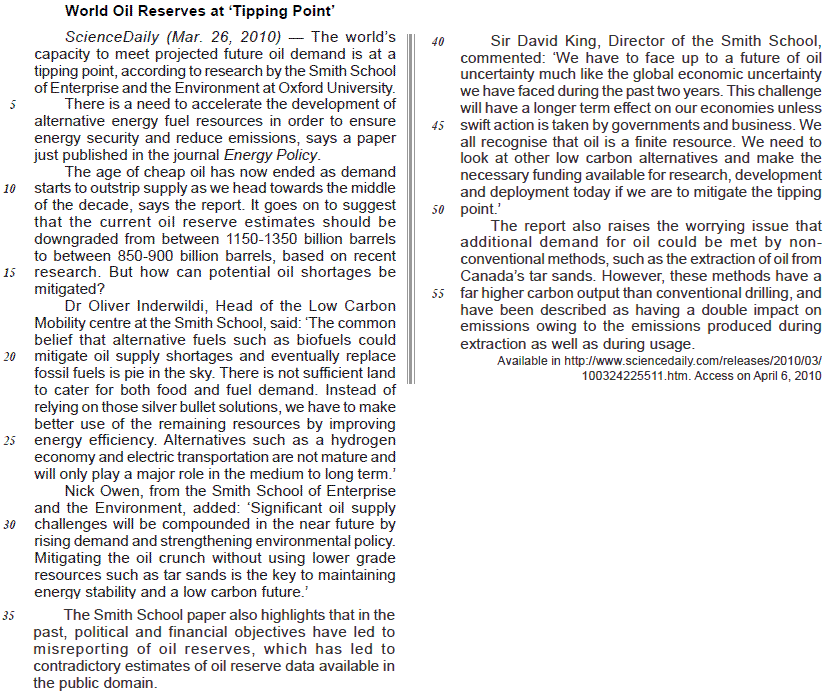
The word in parentheses describes the idea expressed by the word in boldtype in
- A.
...a need to accelerate the development of alternative energy fuel resources in order to ensure energy security and reduce emissions, - lines 5-7 (contrast)
- B.
The common belief that alternative fuels such as biofuels... - lines 18-19 (result)
- C.
Instead of relying on those silver bullet solutions,- lines 22-23 (consequence)
- D.
However, these methods have a far higher carbon output than conventional drilling, - lines 54-55 (reason)
- E.
...the emissions produced during extraction as well as during usage. - lines 57-58 (addition)
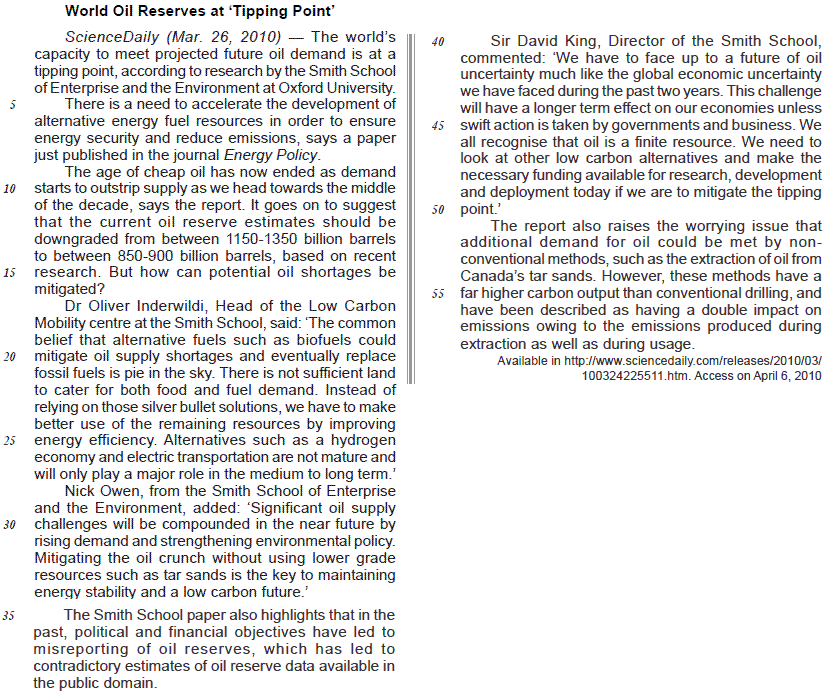
Dr. Oliver Inderwildi supports all of the following statements EXCEPT
- A.
Alternative energy sources, like hydrogen, are still not foreseen as productive in the immediate future.
- B.
It is illusory to believe that the production of alternative fuels will make up for the decline in oil supply.
- C.
There is enough soil available in the world for the production of agricultural products to meet the needs of both food and energy.
- D.
It is more advisable to start using energy more efficiently than to depend on alternative solutions that are not yet entirely developed.
- E.
Using electricity for transportation and reducing the dependence on oil are unripe strategies that still have a minor impact in the current scenario.
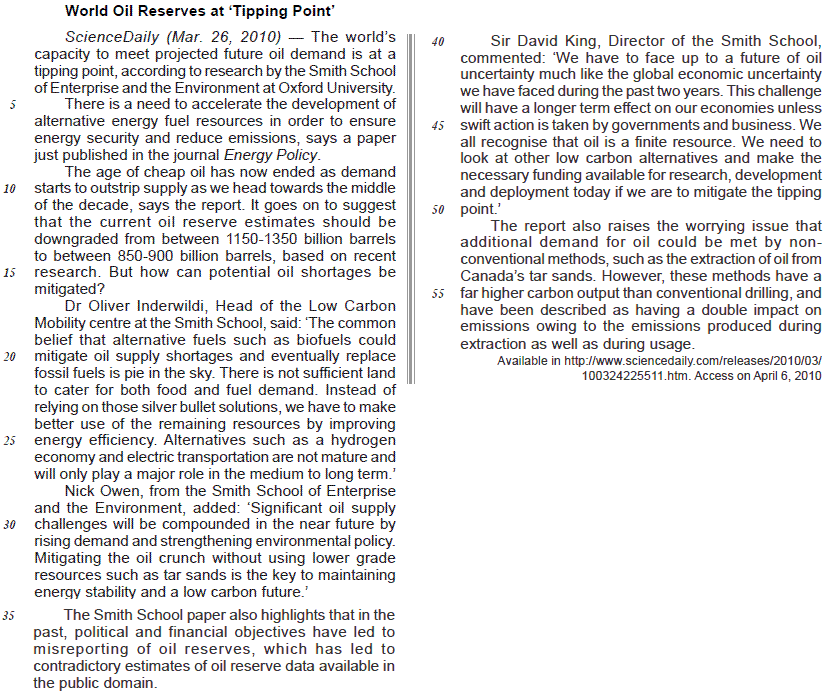
Nick Owen believes that
- A.
stricter environmental regulations will impose even more restrictions on the already heavy challenges in oil supply.
- B.
more demand for oil will certainly not interfere with the current support for ecological programs to reduce carbon emissions.
- C.
further investments in newly found oil reserves will be the only alternative to help maintain future energy stability in the world.
- D.
shifting to fuel production from tar sands can reduce the oil problems, since tar sands are more abundant and less expensive to drill.
- E.
the exploration of lower grade resources seems to be the best solution to conform to the environmental policies in favor of low carbon emissions.
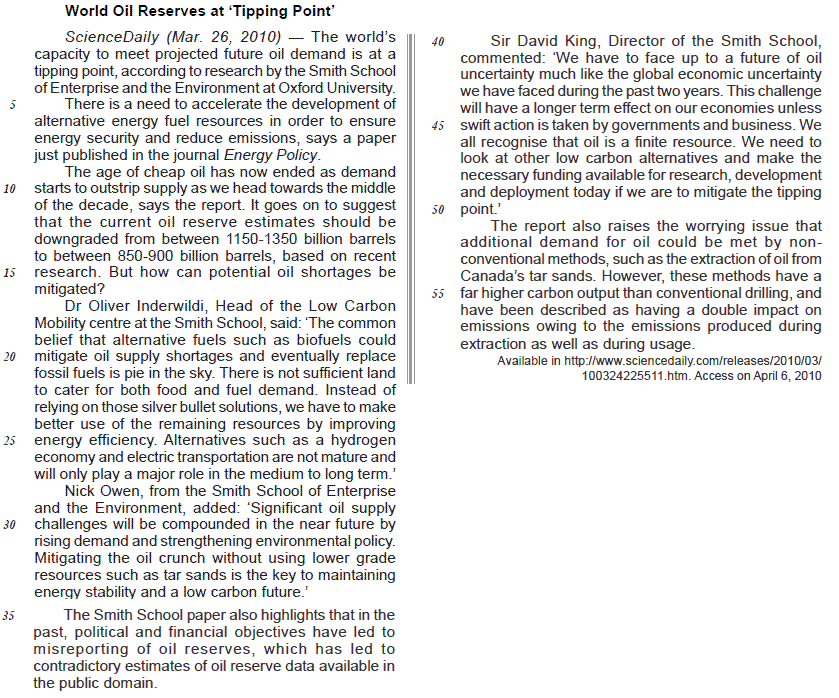
In the text, contradictory estimates of oil reserve data available in the public domain. (lines 38-39) refers to the fact that
- A.
the figures on the probable amount of remaining oil in reserves known have been inaccurately announced.
- B.
researchers in the Smith School have reached conclusions on the use of energy alternatives that confirm the opinion of political leaders.
- C.
oil reserves estimates should be readjusted to indicate that around twelve hundred billion barrels are available for consumption.
- D.
political and financial concerns have led to the announcement of precise data on oil production available to the public.
- E.
only 850-900 billion barrels will be produced by the middle of the current decade.
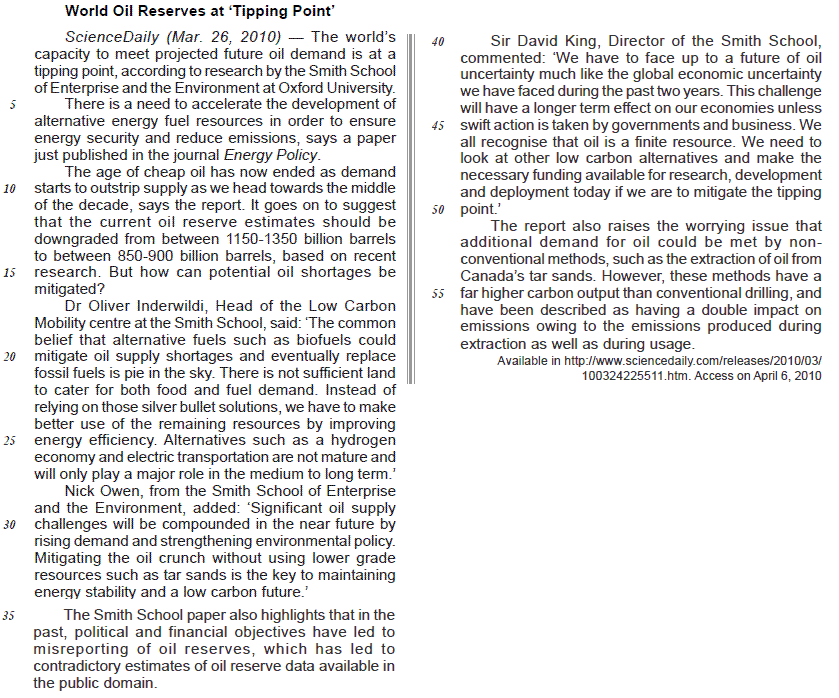
In paragraph 7 (lines 40-50), Sir David Kings main comment is that
- A.
other low carbon alternatives are not available to replace the finite oil resources.
- B.
the tipping point in oil production will not affect the underdeveloped economies of the world.
- C.
business and governments are not expected to take quick measures to face the world economic problems.
- D.
more money has to be spent on financing new fuel technologies that produce low carbon emissions.
- E.
research, development and deployment of low carbon alternatives are the sole responsibility of university researchers.
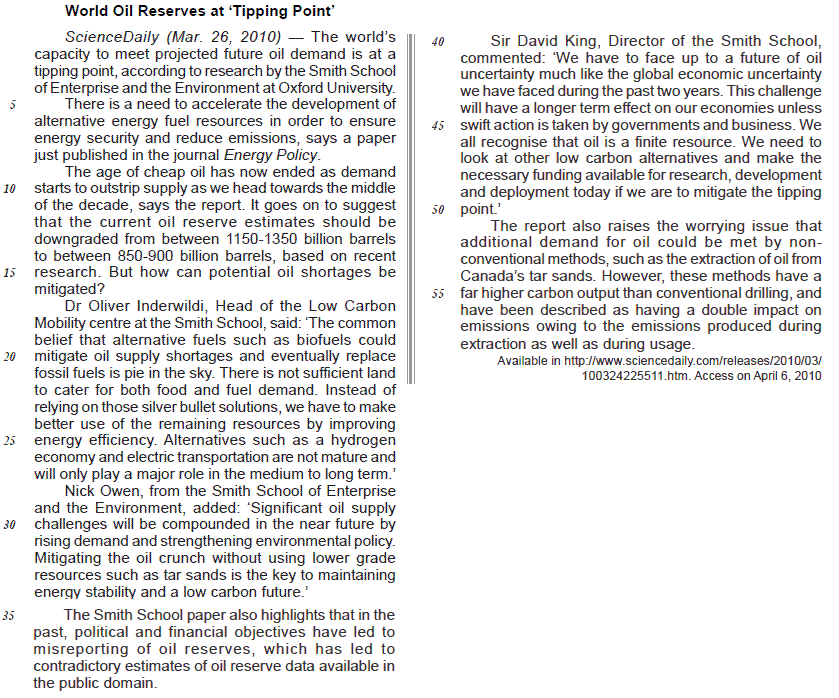
This challenge in This challenge will have a longer term effect on our economies... (lines 43-44) refers to the
- A.
uncertainty about the future of the global economy.
- B.
unclear estimation of oil reserves reported by the government.
- C.
low carbon emissions resulting from conventional oil extraction.
- D.
political and financial interests of the worlds economic leaders.
- E.
confrontation of the unpleasant situation of oil shortage in the near future.
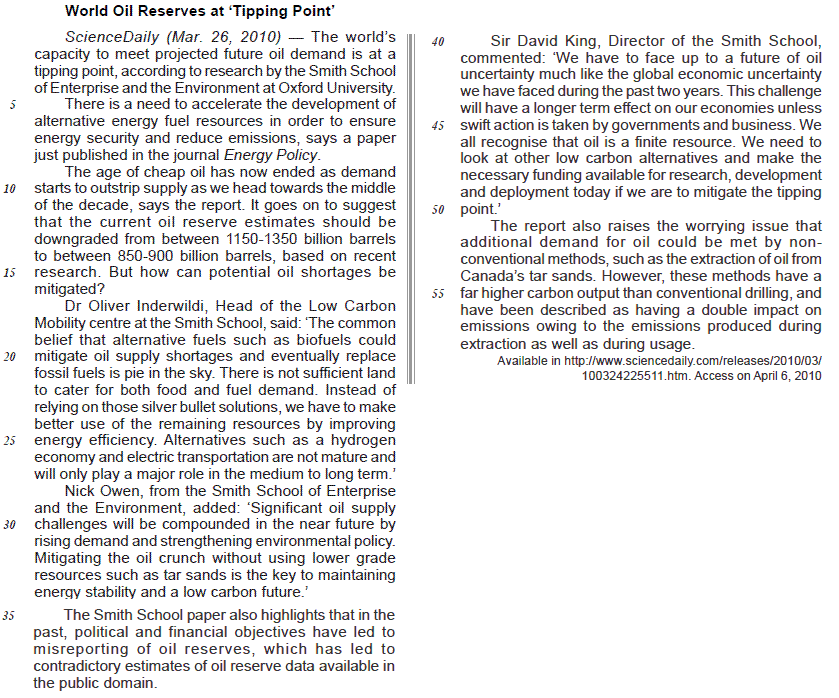
In ...additional demand for oil could be met by nonconventional methods, (lines 52-53) the verb form could expresses
- A.
certainty.
- B.
necessity.
- C.
possibility.
- D.
obligation.
- E.
permission.
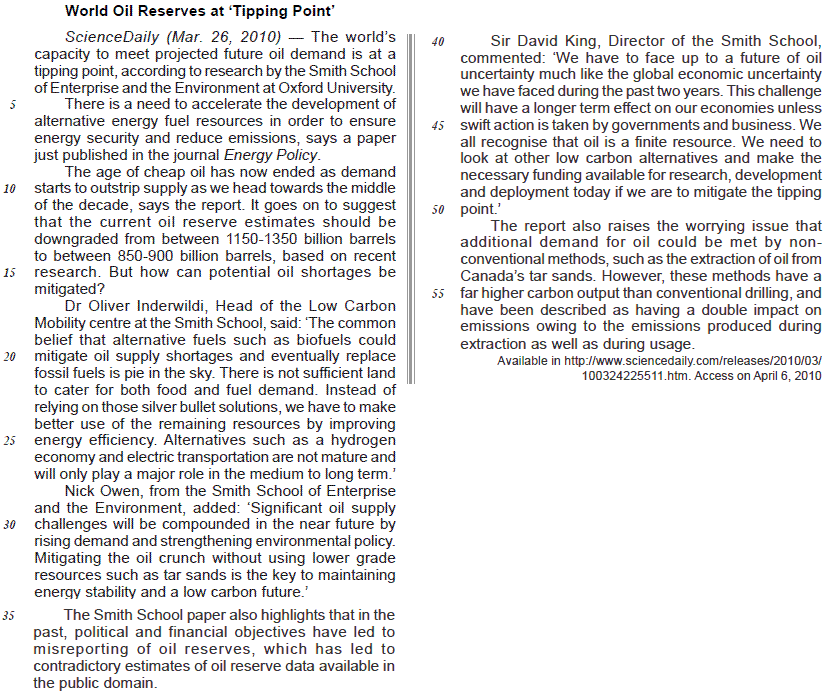
According to the text, extracting oil from the Canadian tar sands
- A.
can be harmful to the environment because it generates an additional demand for oil.
- B.
requires unconventional drilling methods that cause lower impact on the nations carbon footprint.
- C.
is not feasible since it will require non-conventional financing to make up for the lower output rates.
- D.
produces higher carbon emissions resulting from both the extraction and the deployment of fuel from this source.
- E.
has not been authorized since Canadas governmental authorities have passed strict laws against the exploration of such reserves.


